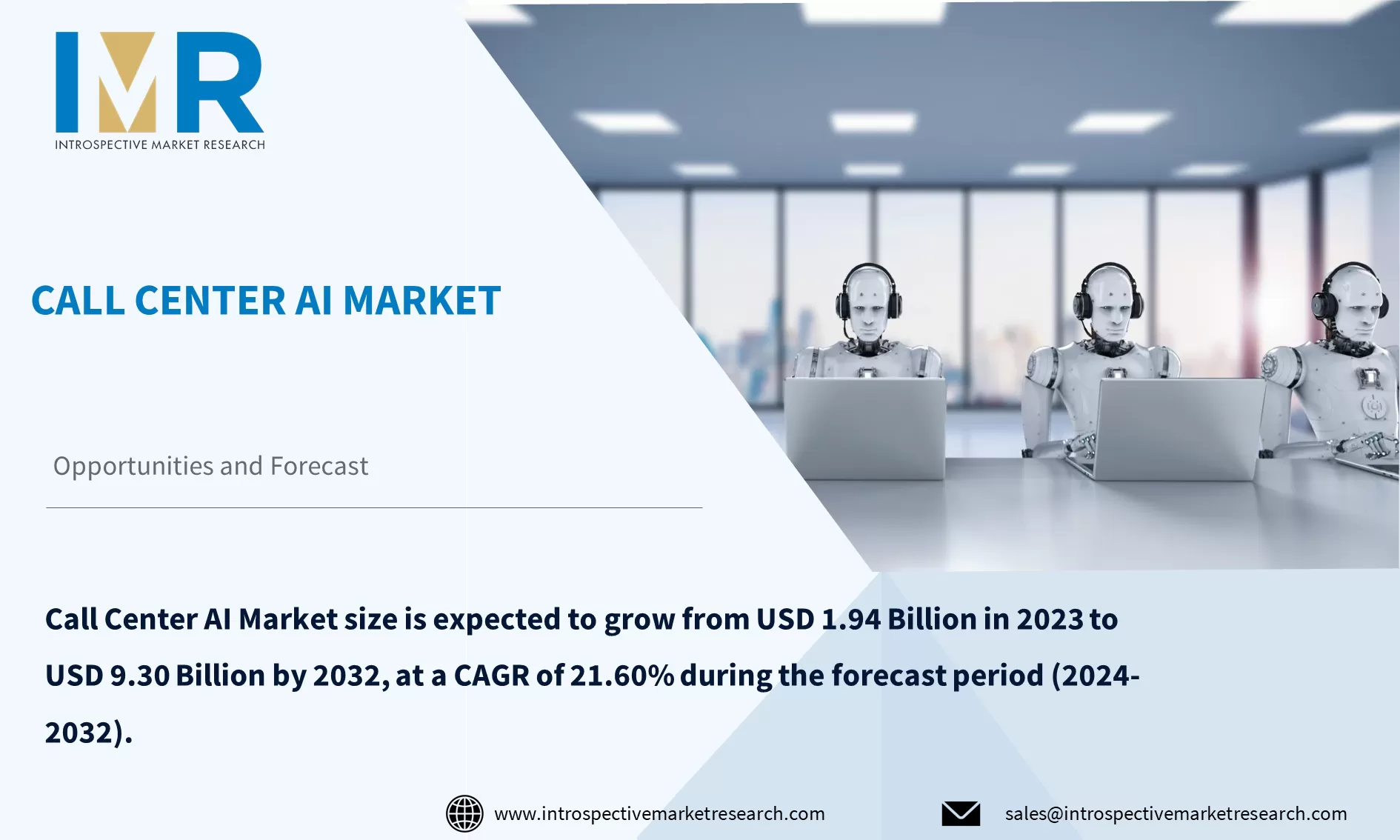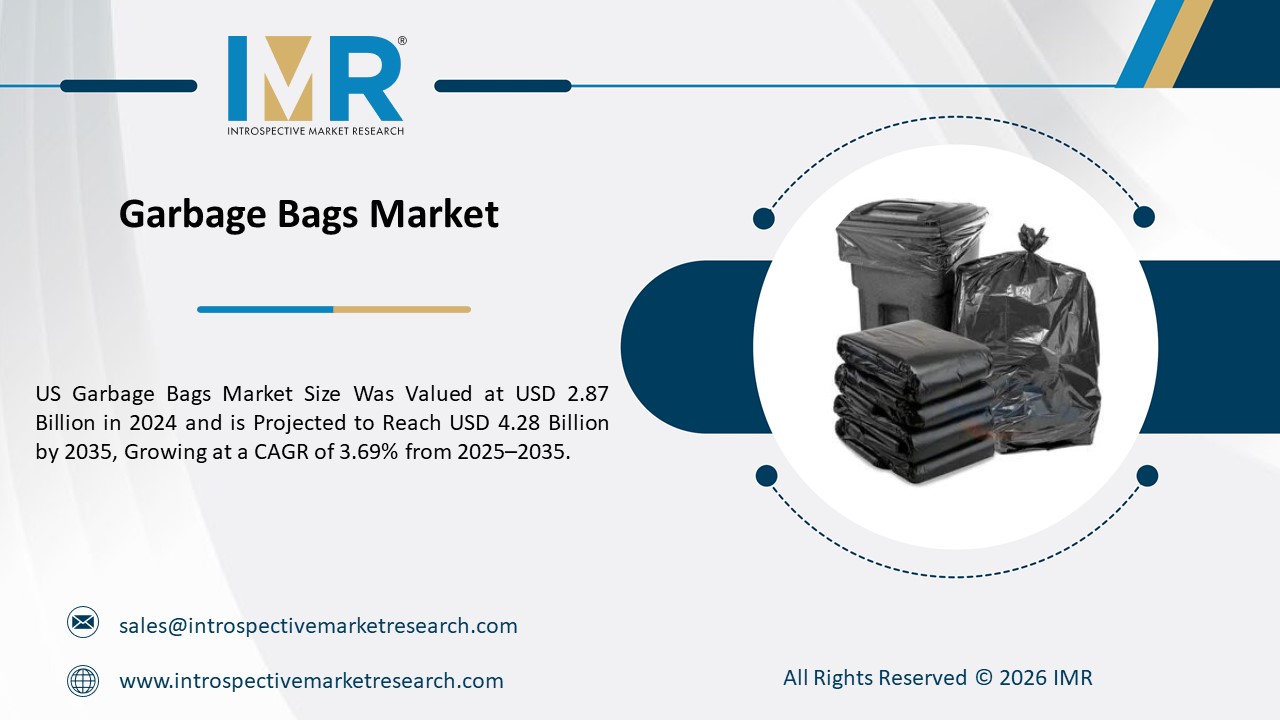Call Centre AI Market Synopsis
According to a new report published by Introspective Market Research, titled, ?Call Center AI Market by Application and Packaging Type: Global Opportunity Analysis and Industry Forecast, 2024?2032,?
Global Call Center AI Market size is expected to grow from USD 1.94 Billion in 2023 to USD 9.30 Billion by 2032, at a CAGR of 21.60% during the forecast period (2024-2032).
Call Center AI automation leverages advanced software and technology to perform routine, time-consuming tasks in call centers, aiming to optimize resources and reduce operational costs. By enhancing the efficiency and effectiveness of call centers, AI helps streamline customer interactions and improves overall customer satisfaction. One of the key contributions of AI in this domain is its ability to measure and analyze call center metrics such as call durations, first call resolutions, and blocked calls. AI software can swiftly gather and process analytics, providing insights much faster than human workers. This capability allows call centers to identify customer issues more efficiently and focus on resolving them, ultimately enhancing the customer experience.
Voice recognition technology is a cornerstone of AI systems in call centers, enabling the understanding and processing of spoken language, which is crucial for voice-based customer interactions. Technologies like interactive voice response (IVR) systems and voice assistants benefit greatly from advancements in machine learning and natural language processing (NLP). These advancements allow call center AI to learn from call data, continuously improving its assistance capabilities. As the digital landscape evolves, the shift towards intelligent and automated customer service solutions is expected to grow, driven by the need for improved efficiency and customer satisfaction. Virtual agents and chatbots provide 24/7 support, reducing wait times and ensuring customers receive timely assistance, thereby boosting customer loyalty and satisfaction.
The implementation of AI in call centers significantly empowers human agents by providing them with intelligent tools to resolve issues more efficiently. NLP and machine learning algorithms enable AI systems to understand and respond to customer inquiries with near-human comprehension, making interactions more seamless and effective. AI also personalizes customer interactions by analyzing data, recommending products or services based on purchase history, and addressing customers by name, which makes engagements more engaging and relevant. Additionally, AI solutions can communicate in multiple languages, allowing companies to cater to a global customer base. By processing large volumes of customer interaction data, AI provides valuable insights into customer behavior, needs, and pain points, aiding in strategic decision-making and service improvements. As customers increasingly expect efficient and personalized experiences, the demand for AI-driven solutions in call centers is set to rise, ensuring compliance with regulations and enhancing security through vigilant monitoring and analysis of customer interactions.
Global Call Center AI Market, Segmentation
The Call Center AI market is segmented based on Component Type, Deployment Model, Size, End-User, and Region.
Deployment Model:
The Deployment Model segment is further classified into Cloud and on-premise. Among these, the Cloud deployment sub-segment accounted for the highest market share in 2023. Cloud deployment offers unparalleled advantages, making it the preferred choice for businesses implementing Call Center AI solutions. It enables seamless accessibility, allowing organizations to remotely deploy and manage their AI solutions. The Cloud's scalability lets businesses dynamically adjust resources based on fluctuating demand, ensuring optimal performance and efficient resource use. As organizations focus on digital transformation, the Cloud deployment model for Call Center AI is becoming a strategic and contemporary trend, providing a competitive edge in the evolving technological landscape.
End-User:
The application segment is further classified into Telecom and IT, Healthcare, Media and Entertainment, and Manufacturing Among these, the Telecom and IT sub-segment is anticipated to show the fastest growth by 2032. Many personal care product manufacturers are moving towards greener alternatives by reducing the number of materials used in packaging. Consumer awareness of the sustainability of product packaging is driving the change. Companies operating in the market have thus adopted paperboard packaging with thin plastic packaging wherever possible.
Region:
The Call Center AI market in Asia-Pacific is projected to show the fastest growth by 2032. The Asia Pacific region is poised to lead the Call Center AI market, driven by widespread adoption of advanced technologies and a strong digital transformation focus for enhanced customer service efficiency. With nations like India, China, Thailand, and Singapore experiencing rapid digital growth, cloud-based contact centers are fueling demand for AI solutions. Businesses prioritize Call Center AI to boost operational excellence and cost-effectiveness, meeting evolving consumer expectations. Government initiatives, including policies and incentives, further stimulate AI innovation. This region emerges as a pioneering hub for Call Center AI, showcasing innovation and technological advancement in customer service solutions.
Some of The Leading/Active Market Players Are-
- IBM (US)
- Microsoft (US)
- Oracle (US)
- AWS (US)
- Google (US)
- Avaya (US)
- Nuance Communications (US)
- Genesys (US)
- 8x8 (US)
- Zendesk (US) and Other Active Players
Key Industry Developments
- In April 2024, Toku, a Singapore-based provider of enterprise-grade cloud communications and customer experience (CX) solutions, announced on Tuesday its intent to acquire AiChat, a Singapore-based artificial intelligence (AI)-powered conversational customer experience (CX) platform. Upon completion, the acquisition strengthened Toku?s position as a full-service CX technology firm and enabled the company to fulfill its vision of delivering seamless, personalized customer engagement across all channels, according to a statement by Toku.
- In March 2024, Zendesk acquired Ultimate, a Finnish generative AI startup, which provided AI chatbot development tools along with automation and analytics features for integrating bots with CRM, order management systems, and other back-end business apps. Its API could also be integrated with external data sources crucial for automating CX, such as data from shippers.
Key Findings of the Study
- The global Call Center AI market is expected to experience substantial growth, with an anticipated increase from USD 1.94 Billion in 2023 to USD 9.30 Billion by 2032, indicating a robust CAGR of 21.60% during the forecast period (2024-2032).
- Voice recognition technology plays a pivotal role in AI systems for call centers, enabling understanding and processing of spoken language, leading to advancements in interactive voice response (IVR) systems and voice assistants.
- The Asia-Pacific region is projected to exhibit the fastest growth in the Call Center AI market by 2032, driven by widespread adoption of advanced technologies, strong digital transformation focus, and government initiatives stimulating AI innovation.






